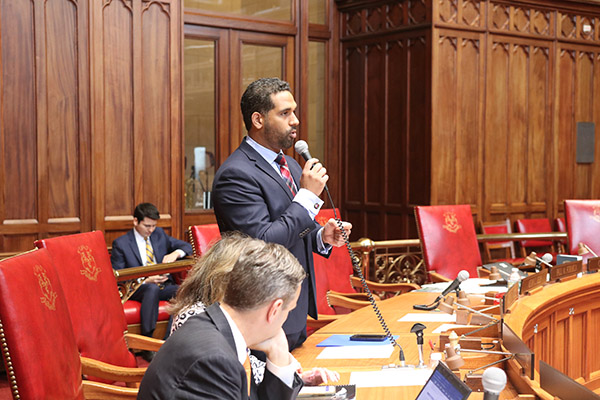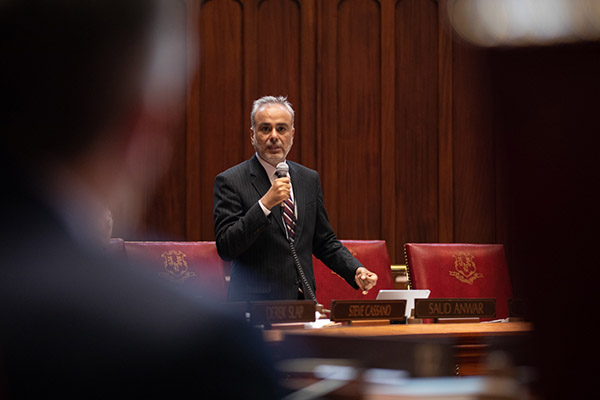Senator Bradley Strongly Supports State Senate Passage
of Legislation Banning Ghost Guns and Two Other Gun Safety Bills

HARTFORD, CT – Today, State Senator Dennis Bradley (D-Stamford) strongly supported legislation that will enhance gun safety across Connecticut. On Thursday, the Senate advanced three bills that would require guns to be stored in locked containers in homes with minors, prohibit the manufacturing of firearms without serial numbers and “ghost guns,” and require pistols and firearms in unattended motor vehicles to be locked and secured. On the state Senate floor, Sen. Bradley talked about the need to ban ghost guns. He said the bills passed will make Connecticut safer.
“This legislation makes Connecticut safer and more knowledgeable when it comes to guns and gun safety and I strongly support the pieces of legislation we have passed today,” said Bradley. “When a firearm does not have any marking and is not registered, it creates a plethora of issues for law enforcement when attempting to trace the firearm back to its owner when it is used in a crime. Ghost guns are becoming a problem and getting these weapons off the street will only make our state safer. Additionally Ethan’s Law, which calls for safe and secure storage of firearms whether they are loaded or not, ensures the safety of our state’s youth. I commend Ethan Song’s parents, Kristin and Mike, for their courage and advocacy for better gun safety laws in our state.”
Ghost Guns
The rise of 3D printing and new technological possibilities has also led to the rise of untraceable handguns. With current kits available online, anyone, including those legally unable to possess guns, can make their own firearm with no serial number in about three hours out of a combination of plastic parts and metal parts. These guns have been seized in Connecticut towns including Torrington, Ridgefield and Waterbury and were used in California mass shootings in 2013 and 2017. In both California shootings, two individuals who could not legally own firearms each killed five people with “ghost guns” utilizing custom-made parts.
House Bill No. 7219, which passed 28-7, prohibits manufacturing a firearm without a serial number, manufacturing a plastic gun that can pass through security measures if its grips, stocks and magazines are taken off, and possessing, receiving or transferring an unfinished firearm frame or lower receiver lacking a serial number. The Department of Emergency Services and Public Protection would need to issue serial numbers for those parts.
The law provides exemptions for firearms produced by federally licensed manufacturers, antique firearms and firearms made before October 1, 2019 provided they are lawfully possessed. First-time offenses are class C felonies, but courts can suspend prosecution for first-time offenders if the violations are not serious and an offender is not likely to violate the law further. California and New Jersey previously passed similar legislation; New York and Washington state put “ghost gun” bans into place earlier this month. New Jersey’s law has seen success; at least 15 “ghost gun” companies ended sales in that state since it was enacted.
Ethan’s Law
Current state law requires gun owners to secure loaded guns in locked containers if a minor under the age of 16 lives in their home. House Bill No. 7218, commonly referred to as “Ethan’s Law,” strengthens that law by requiring safe storage for all guns – loaded and unloaded – and additionally increases the age restriction from 16 years old to 18 years old. The legislation further makes negligent storage of a firearm, loaded or unloaded, a Class D felony and requires the Connecticut Board of Education to develop a K-12 guide on gun safety. HB 7218 passed by a 34-2 vote.
Ethan’s Law, House Bill 7218 (HB 7218), is named for Ethan Song, a 15-year-old from Guilford who died in 2018 when he was accidentally killed by an improperly stored gun at a friend’s house. The gun’s owner could not be prosecuted in relation to Song’s death because the gun was not loaded when it was stored.
According to the Centers for Disease Control, in 2017, at least 2,696 children and adolescents were unintentionally shot after a gun was improperly stored; more than 100 were killed. Another 1,100 children took their own lives, many with unsecured firearms. The Harvard School of Public Health found that adolescents who die by suicide are twice as likely to have access to a gun at home than those who survive suicide attempts.
Safe Storage in Cars
House Bill No. 7223, which passed 20-15, concerns safe storage of firearms in cars and would prohibit storing a pistol in an unattended motor vehicle, unless that pistol is in the trunk, a locked glove box or a locked safe. It would make first-time offenses class A misdemeanors with further offenses being class D felonies. Law enforcement and certain security personnel receive exemptions, and the court can suspend prosecution for first-time offenders found unlikely to violate the law again.
This law comes as many cities in the United States see rising numbers of gun thefts from cars, seeing year-to-year increases of up to 40 percent; Atlanta sees up to 70 percent of all reported gun thefts being guns stolen from cars.
This legislation can reduce the up to 600,000 guns stolen each year and reduce the number of illegal guns on streets, also preventing tragedies. In Florida, a pistol stolen from an unlocked vehicle in 2014 was used to kill a police officer later that year; in Tennessee, a handgun stolen from a car in 1994 was traced to the murder of a teenage girl in Nashville in 2015.
Just this week, a Hartford man was indicted for stealing firearms from vehicles in Newington and Ellington, then selling those guns to other individuals.
